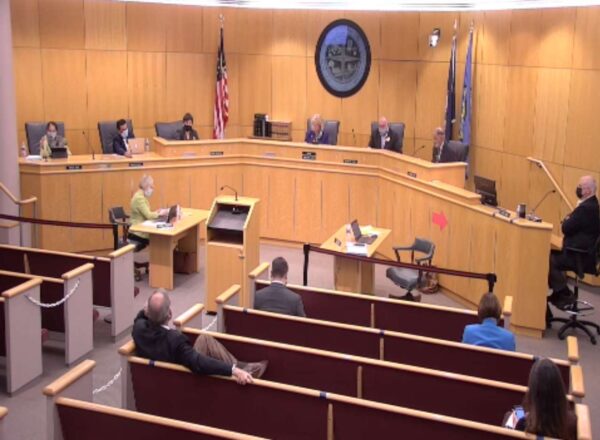WETA’s latest season of “If You Live Here” will feature the community’s story, art and people on Feb. 14 at 8 p.m.. on WETA Metro and 9 p.m. on WETA PBS. Producers describe Reston as one of America’s most successful planned communities.
The show is a house-hunting series hosted by best friends Christine Louise and John Begeny. The hosts tour homes and communities with local realtors and explore neighborhoods in the DC Metro area.
Here’s more from WETA on the show.
This episode shares the history and vision of Robert E. Simon, the “R-E-S” in Reston, and how the water, paths and public art connect residents. Hosts John and Christine visit 3 different homes -with ponds, trails and penthouse views – guided by the show’s first mother-daughter/resident-realtor team, Boofie and Margaret O’Gorman (left).
Other areas on the show include Bowie, Capitol Hill, Del Ray Alexandria, Falls Church and Brookland.
Photo courtesy WETA
After months of deliberation, the Town of Herndon has officially eased restrictions on accessory dwelling units.
The changes, approved unanimously by the Herndon Town Council earlier this month, allow the by-right use of ADUs in single-family units. The move eases current restrictions on renting out spaces inside and in detached units, which are were previously allowed only through special exceptions. The change also removes the age restriction on ADUs to those over 62 or disabled.
“People have told us they want it,” said council member Signe Freidrichs.
The move comes as neighboring jurisdictions loosen restrictions for accessory units. Fairfax County eased rules for home conversions in June.
Councilmembers said the policy change was a good method to increase the stock of affordable housing in the town while ensuring that the town’s essential workers and teachers could live where they worked.
“This is part of an overall revitalization of housing in Herndon that needs to be addressed,” said council member Cesar del Aguila, adding that he was not worried about the impacts of easing restrictions on ADUs.
While issues like changing the character of neighborhoods and overburdening infrastructure may arise, council member Pradip Dhakal noted that people are already renting out portions of their homes.
He said he was hopeful it would boost the town’s supply of affordable housing. He cautioned that it was not a solution to the issue.
David Stromberg, the town’s zoning administer, emphasized that residents would still need to comply with a variety of other requirements.
Town of Herndon Mayor Sheila Olem also noted that residents would still need to go through the zoning and permitting process, requiring code-compliant stoves, staff review of plans, and property inspections before the space is occupied.
Councilmembers debated the merits of allowing the by-right use of ADUs for townhouses. Councilmember Sean Regan suggested asking the town’s planning commission to revisit the issue in a separate process.
ADUs inside or attached to homes cannot exceed 40 percent of the main unit or 1,200 square feet. The maximum for detached units is 900 square feet. Only up to three people can live in an ADU separate and in addition to one family in the main unit.
One additional parking space would be required for ADUs while two would be required for detached units in single-family homes. For detached units, the town council also expanded setbacks from two feet to 10 feet on the rear and sides of the property. Comparatively, Arlington requires a five-foot setback while Alexandria’s setback varies between 1.5 and five feet.
While the effort is intended to allow the slow densification of the town, Stromberg said he only expects two or three by-right uses every year.
Photo via Town of Herndon

Town leaders want more input from residents about whether it should ease restrictions for secondary living quarters that can be part of or detached from homes.
Current rules — in place since 1983 — have limited accessory dwelling units (ADUs) for those who are older than 62 or who have a disability. But following changes in other states and by other area governments, including Fairfax County, Herndon is looking to drop those requirements and make other adjustments.
“This is relaxing the current requirements, but it’s not making it easy,” zoning administrator David Stromberg said during an Oct. 26 meeting prior to a public hearing. “There still are … a lot of standards that have to be met.”
Town council delayed a decision until its Nov. 16 meeting.
In the works since April, the review of ADU rules came after some residents expressed frustrations about the process.
Proposed changes have also called for allowing up to three people live in an ADU (raising the current restriction from two people), reducing a detached ADU maximum space from 1,200 square feet to 900 square feet, and more.
The changes would also allow many kinds of construction to happen without a special approval process, but it would also ensure building inspectors and others go through properties to make sure they’re safe.
One resident commented during the Oct. 26 public hearing. Arthur Nachman, of Vine Street, said he was against the changes because it would allow non-family members to be in detached buildings, which he said shouldn’t happen in a residential neighborhood.
While some councilmembers shared concerns and wanted more time for residents to provide feedback, Councilmember Jasbinder Singh spent the most time expressing his doubts, saying he thought it would change the town’s character.
Based on the number of ADUs occurring in Arlington County from 2017 to 2021, Stromberg estimates that the rate in Herndon will be two or three per year if they’re “by right.” Singh said he disagreed and suggested more could happen.
The delayed vote will allow the town to get more input, though technically the public hearing has closed. People can still share their opinions during a regular public comment portion of the meeting.
“It will give us time to think more about all the issues and really what motion should be made if at all,” Singh said.
Neighboring governments have already loosened restrictions. Fairfax County revised its rules for accessory units, which it calls accessory living units, as part of a larger zoning overhaul this summer, dropping its requirement that the units be restricted to older adults and people with disabilities.


